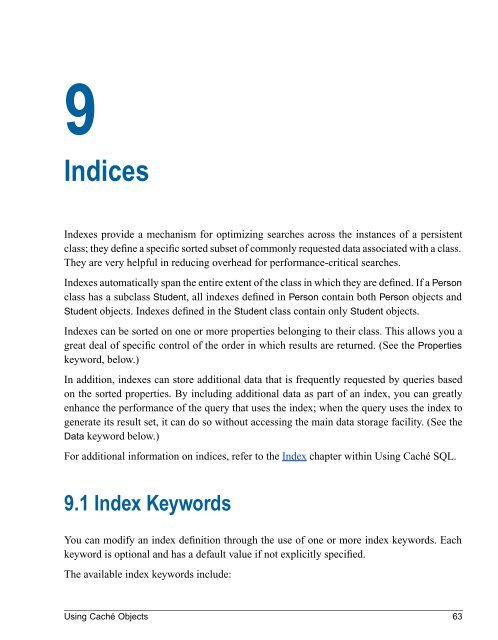Using Caché Objects - InterSystems Documentation
Using Caché Objects - InterSystems Documentation
Using Caché Objects - InterSystems Documentation
Create successful ePaper yourself
Turn your PDF publications into a flip-book with our unique Google optimized e-Paper software.
9<br />
Indices<br />
Indexes provide a mechanism for optimizing searches across the instances of a persistent<br />
class; they define a specific sorted subset of commonly requested data associated with a class.<br />
They are very helpful in reducing overhead for performance-critical searches.<br />
Indexes automatically span the entire extent of the class in which they are defined. If a Person<br />
class has a subclass Student, all indexes defined in Person contain both Person objects and<br />
Student objects. Indexes defined in the Student class contain only Student objects.<br />
Indexes can be sorted on one or more properties belonging to their class. This allows you a<br />
great deal of specific control of the order in which results are returned. (See the Properties<br />
keyword, below.)<br />
In addition, indexes can store additional data that is frequently requested by queries based<br />
on the sorted properties. By including additional data as part of an index, you can greatly<br />
enhance the performance of the query that uses the index; when the query uses the index to<br />
generate its result set, it can do so without accessing the main data storage facility. (See the<br />
Data keyword below.)<br />
For additional information on indices, refer to the Index chapter within <strong>Using</strong> <strong>Caché</strong> SQL.<br />
9.1 Index Keywords<br />
You can modify an index definition through the use of one or more index keywords. Each<br />
keyword is optional and has a default value if not explicitly specified.<br />
The available index keywords include:<br />
<strong>Using</strong> <strong>Caché</strong> <strong>Objects</strong> 63

















